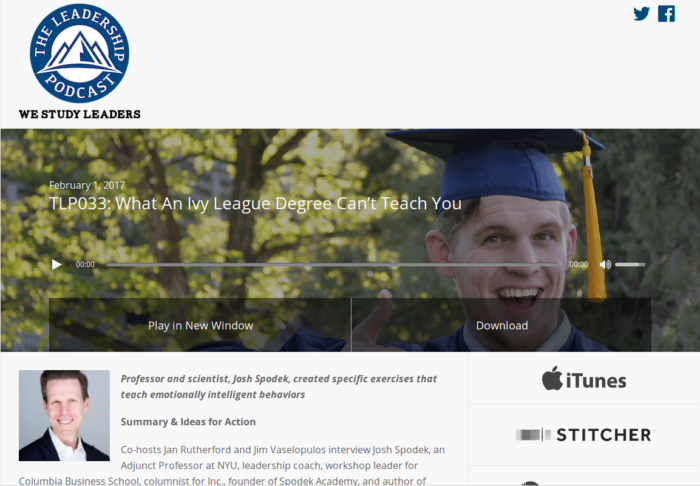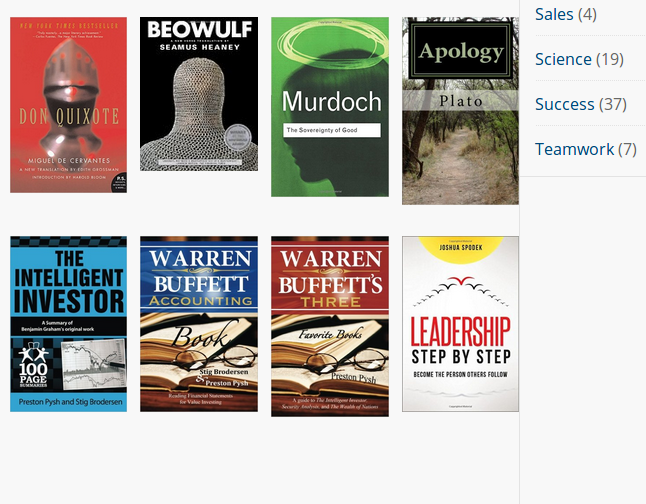The Leadership Podcast interviewed me. What great interviewers!
The Leadership Podcast—hosted by Jan Rutherford and Jim Vaselopulos—posted their interview of me today, “What An Ivy League Degree Can’t Teach You.”
Jan and Jim have clear passions and experience for leadership and interviewing. Their questions got to the heart of what I teach, what my book, Leadership Step by Step, is about, my goals in teaching, my motivations, and the inside story.
Highly recommended!
Here’s their introduction and description on their page with the interview
Professor and scientist, Josh Spodek, created specific exercises that teach emotionally intelligent behaviors Â
Summary & Ideas for Action
Co-hosts Jan Rutherford and Jim Vaselopulos interview Josh Spodek, an Adjunct Professor at NYU, leadership coach, workshop leader for Columbia Business School, columnist for Inc., founder of Spodek Academy, and author of Leadership Step by Step (launching February 2017). Josh talks about how academic teachings failed to prepare him for entrepreneurship, and how learning a theory is insufficient without practicing it. Â They discuss the critical need for emotional intelligence, and psychological safety, and how they can be developed, and the techniques Josh uses to strengthen them.
Listen in to learn more about leadership practices, releasing passion, changing beliefs, and nurturing teams.
Key Takeaways
[2:59] Josh is concerned that academic education is emotionally and socially passive. At Ivy League schools, Josh learned was intellectually challenged, but he was not taught socially and emotionally. Josh had trouble working with others when he founded his first company. His leadership was ineffective during the recession, and investors forced him out as CEO.
[10:34] Reading books, and learning theory, but not learning how to practice the theory, you might as well read about weights, but not actually lifting weights. Josh wanted a place to teach leadership. For Spodek Academy, Josh researched fields that show leadership, to learn from their techniques. He created exercises, tested and refined them, to teach sensitivity to others’ emotions.
[18:32] Joshua cites exercises by Marshall Goldsmith, such as “FeedForward,†and “No, But, However,†that taught him so much about listening and empathy. Small changes in behavior change your worldview. Josh organized Goldsmith’s exercises, and others, into a progression of learning, with each exercise being more challenging, and all tied together.
[19:58] One exercise is to write down your inner monolog, the voice inside your head — not what you’re thinking about, but the actual words. A later exercise is to speak your inner monolog. That’s scary, because people hear it. It turns out to be authentic, and people respond genuinely. Further exercises are to write your mental model (what creates the inner monolog), and models of others.
[25:12] We’ve all been hurt. When part of your identity is mocked, you can’t get rid of it, but you can hide it. We don’t get hurt by casual acquaintances, but by people close to us. We learn to close off our vulnerabilities. Leaders who learn to get people to get past vulnerability to share their passion can get them to engage in their work, for purposes about which they are passionate.
[26:50] Jim talks about psychological safety, determined by Google’s Project Aristotle to be the number one key performance driver of high performing teams. With psychological safety, it is easier to have discussions in touch with your inner monolog. Josh says Laszlo Bock’s research at Google revealed the need for our educational system to educate to emotional intelligence.
[29:47] Josh teaches adopting a challenging belief, in Unit 2 of Leadership Step by Step. Unit 1 is Understand Yourself. Unit 2 is Lead Yourself. A leader needs to know that beliefs affect how people view the world. Two people, looking at one thing, see two things. To change motivation, change belief. Joshua describes changing the “dandelion belief,†to the “burning building belief.â€
[33:36] If you can look at a difficult problem from a different perspective, and solve it that way, you have an additional way to solve problems, or more intelligence. Helping someone change a belief is simpler than convincing them of something. The progression in the book is, understand your belief, adopt a challenging belief, understand other’s belief, and help them adopt a belief.
[37:48] Visiting North Korea taught Josh about himself. Seeing pictures of Kim Jong Il everywhere, and tuning them out, made him wonder what he tunes out here in the U.S. It hit him, that advertising and brands are what he tunes out. We incorporate into our reality things that are actually aspects of our external culture. Sometimes it takes an outsider perspective to see it.
[40:48] Josh teaches entrepreneurs, when they find an industry where everybody has the same fixed beliefs, it is a huge opportunity, especially when the beliefs do not match the interests of the market. The more fixed the belief, the more the opportunity. Google is an example. Before Google were simple site aggregators, like Alta Vista. Google tried to sell “search†for $1 million. No takers!
Quotable Quotes“I don’t think you can learn leadership without facing these emotional and social challenges.â€
“When you learn physics, you’re learning a lot about the world … but … no one teaches you empathy, or self-awareness.â€
“If you’re really good at sales, then you’re going to be valuable to a lot of companies, especially when times get tough.â€
“A carpenter works with tools on a piece of wood. A leader works on emotions, on a person.â€
“You can automate a lot of things, but not the human-to-human connection.â€
Listen to The Leadership Podcast’s “What An Ivy League Degree Can’t Teach You.”
They honored me by putting my book on their list of books, amid Plato, Cervantes, Warren Buffet, and Graham and Dodd (there are many more than the ones pictured)!
Thank you, Jan and Jim!
Read my weekly newsletter

On initiative, leadership, the environment, and burpees

